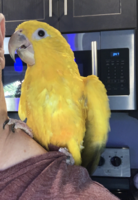The vet appointment went well, even though she wasn't really herself that day. She hadn't eaten anything that morning so her weight was down and she was dehydrated some. She will not stand on the perch to be weighed, nor will she sit in the bin on top of the scale. Oddly enough, she will lay on her back for me. I was able to get her on her back on the scale and take my hands away. She just laid there until they were able to get her weight and when I put my finger down she grabbed it and pulled herself up. The vet tech said he's never weighed a bird that way but whatever works. I had purchased a fabric collar for her because the plastic ball collar is right over the middle of her crop. They got it on her and said she tolerated it well, but when they turned their backs on her, she folded it in half and started pulling a feather off of her leg. They put the ball collar back on her. She may not have felt well, but her spunky personality wasn't diminished at all.
I had a really good conversation with the vet and she had just come back from an exotic bird conference. She said that is a lot of misinformation about ABV, and in reality, there is a lot that they just don't have enough hard science on yet. There is a lot that they suspect, but it is still unproven. She recommends that the female never share a cage with her mate again. We did run another test to rule out a false positive. They also ran another test that is more sensitive and will be able to tell if the plucking is related to a high level of antibodies in her system. This would indicate that her body is fighting the infection and the plucking is related to an immune system response. If the second test confirms it, then I'll need to get the male tested as well. If he is negative, then we will look for another mate for him. My girl will never be bred and will remain a pet. She was never intended to be a pet, just somewhat socialized to make it easier to access eggs and chicks during breeding. Now I'll get to spoil her rotten. I guess it's not a bad thing overall. I went over my protocol with the vet and she believes it is sufficient to prevent the spread to my other pets. Again, the science on the transmission is lacking, but the most likely source is the oral/fecal route as well as intimate contact between birds. She agrees with my theory that the cockatiels may be the source of the infection. The testing of 51 cockatiels is cost-prohibitive, and a logistical nightmare. I still have more questions than answers, but I do feel better equipped to take care of her and protect the other birds. As for her long term prognosis, it's difficult to say. The vet said the virus is a lot more common than they had originally thought. A lot of times it is discovered through routine testing while the bird is being treated for something else. Many birds live long healthy lives with it and have no ill effects. She said that others go through cycles where it will flare up and cause issues like plucking, then calm down again and not be an issue for years. For some birds the course of the disease is devastating and the period between infection and death is relatively short. There are multiple strains of the virus and none of them have been fully investigated yet, and they really don't know which strain causes a particular outcome. She's being treated with an anti-inflammatory for the time being, and that seems to be helping. We're just going to take it slow and see what happens.
As for the Patagonians with ABV that I mentioned in another thread, I've decided to sell them. One of my neighbors has already complained about them. I got an email about them. She basically said they were driving her and her husband nuts and they could hear it inside their house and was there anything I could do about it, and, and, and.... They have a long history of complaining about noise in the neighborhood and I would rather not be the next victim of their harassment. I put up a tarp to muffle some of the noise but made it clear that sunrise and sunset squawking is a natural bird thing and there isn't anything I can do about it. I also explained that bringing them inside is not an option. Hopefully, that's enough to keep them at bay for a while. We're a lot closer than they are, and we can't hear them inside at all. I'll be selling them with full disclosure, and if I don't feel the buyer is capable of providing for them in a way I feel comfortable, then I won't sell.




